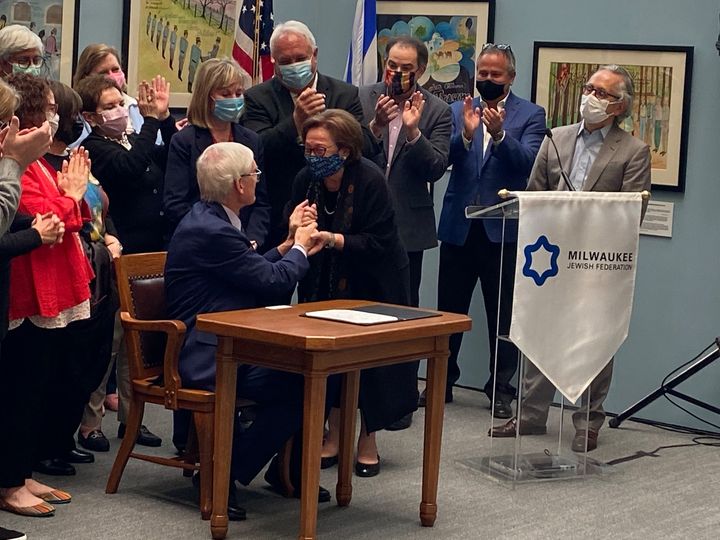
Gov. Tony Evers signed Wisconsin Act 30, mandating Holocaust education in Wisconsin schools, on April 28. (Submitted photo)
Three years ago, as she was stepping down from her post as the chairwoman of the board of directors for the Nathan and Esther Pelz Holocaust Education Resource Center (HERC), Bev Greenberg took a good, hard look at modern society.
Her conclusion? “People are forgetting the Holocaust.”
“Look at the increase in violence and hate incidents and antisemitism, throughout not only Wisconsin but throughout the country, and the world as well,” said Greenberg, who has been involved with HERC’s mission of Holocaust education and awareness for the past 15 years. “Our Holocaust survivors are dying and leaving us, and we won’t have those first-hand accounts. And we have others looking at the Holocaust and saying, ‘Oh, maybe it never happened.’”
With the support of HERC, Greenberg formed a task force to explore the possibility of passing legislation that would mandate Holocaust education in Wisconsin’s schools.
Several of the members of the task force, including its co-chair Jodi Majerus, were motivated by their Catholic faith to champion this cause.
“We need to help our kids understand how human rights were violated during that period of time and help them to analyze the decisions and actions that a group of people in a time of crisis allowed to happen,” said Majerus.
Students from the Notre Dame School of Milwaukee (NDSM) attended legislative sessions in Madison on two separate occasions to show support for the bill, said David D’Antonio, middle school director for NDSM’s girls campus. At the time, the students were in the middle of studying the Holocaust.
“They were in shock that this atrocity could ever occur — and they were in shock that anyone could ever attempt to deny (that it happened) or attempt to exclude it from the curriculum,” said D’Antonio. “We had some student leaders come forward saying, ‘I would be proud to stand tall in my Notre Dame uniform, in a room full of committee members, to advocate that this bill becomes a law.’”
On April 28, Gov. Tony Evers officially signed into law Senate Bill 69 (now Wisconsin Act 30), which requires school districts, independent charter schools and private schools participating in a choice program to provide instruction on the Holocaust and other genocides at least once in grades five through eight, and again at least once in high school.
The bill was authored by Sen. Alberta Darling (R-River Hills) and Reps. Jon
Plumer (R-Lodi) and Lisa Subeck (D-Madison). Prior to Evers’ signature, the bill was passed unanimously both in the State Assembly and the State Senate.
Frank Busalacchi, former Secretary of Transportation for the State of Wisconsin and a lifelong Catholic, joined Greenberg’s task force 18 months ago.
“My upbringing in the Catholic Church has played a huge part in joining this cause,” he said. “Pope Francis preaches love and acceptance. There is so much hate in the world and we need to learn lessons from the past so they are not repeated.”
Growing up in the Third Ward, Busalacchi said he knew a lot of Jewish people, but his own understanding of the Holocaust was minimal.
“As I got older, I learned bits and pieces, but my first major introduction was when I visited Washington DC’s Holocaust Museum,” he said, describing the visit as “heart-wrenching.”
In 2018, Busalacchi and his wife visited Berlin, and witnessed the countless memorials in that city to various groups that were targeted by the Nazis. They were also greatly impacted by “the tiny Stolperstein memorials — small brass plates on the sidewalks in front of (the) last residence indicating name and life dates before Nazi extermination or persecution,” said Busalacchi. Those small memorials “truly hit home.”
“The German motto ‘Never Forget’ stuck with me and when my friends, Bev and Marty Greenberg, asked for my help in getting the legislation passed, I knew it was something I needed to do,” he said.
For her part, Majerus grew up with parents who “valued education above all” and who “impressed upon us the importance of learning history to understand social injustices of the present, and how that tied into history.”
At the dinner table of her parents, Raymond (a noted labor leader who served as the treasurer of the United Auto Workers) and Alyce, Jodi and her siblings Tracy and Rick were encouraged to discuss “what it means to be fair, what it means to respect your community — and who is your community?”
“Because it’s not just your brother and sister next to you — it’s your school, your neighborhood, your city, your government,” said Majerus.
These are exactly the lessons that Greenberg said she hoped will be instilled by mandated Holocaust education. She acknowledges that the topic is “daunting,” and that teachers may struggle to know exactly when and how to introduce such serious subject matter. “If we can provide our teachers with materials that make that test easier for them, that’s what we want to do,” she said.
Teaching about genocides like the Holocaust is especially critical to Catholic education, said D’Antonio. “It relates to the core of Jesus’ teachings around love of our neighbor and our calling and responsibility to work with, learn about, support, love, learn from those who are our neighbors, but those who are also different from us — and that is across the lines of race, religion, gender, socioeconomic status.”
To support educators in implementing the study of the Holocaust, HERC will soon launch a new website that will make curricular resources on Holocaust education more easily available to teachers. This resource, which will be made available at no cost to all Wisconsin educators, will include more than 115 lesson plans categorized by theme, grade level, time commitment and social studies standards. Planning is underway for teacher workshops, professional development seminars, and many more initiatives to support Wisconsin educators now responsible for fulfilling the Holocaust education mandate.
